新概念英语第二册第69课
新概念69课课文原文
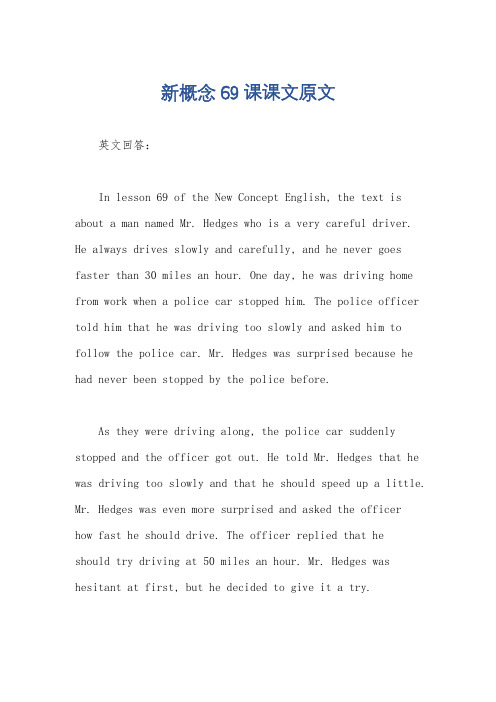
新概念69课课文原文英文回答:In lesson 69 of the New Concept English, the text is about a man named Mr. Hedges who is a very careful driver. He always drives slowly and carefully, and he never goes faster than 30 miles an hour. One day, he was driving home from work when a police car stopped him. The police officer told him that he was driving too slowly and asked him to follow the police car. Mr. Hedges was surprised because he had never been stopped by the police before.As they were driving along, the police car suddenly stopped and the officer got out. He told Mr. Hedges that he was driving too slowly and that he should speed up a little. Mr. Hedges was even more surprised and asked the officer how fast he should drive. The officer replied that heshould try driving at 50 miles an hour. Mr. Hedges was hesitant at first, but he decided to give it a try.After driving at 50 miles an hour for a while, Mr. Hedges felt more comfortable and realized that he had been driving too slowly all this time. He thanked the police officer for stopping him and giving him some advice. From that day on, Mr. Hedges became a more confident driver and was no longer afraid to drive faster when necessary.中文回答:在新概念英语第69课中,文章讲述了一个叫做赫奇斯先生的人,他是一个非常谨慎的司机。
新概念英语69课
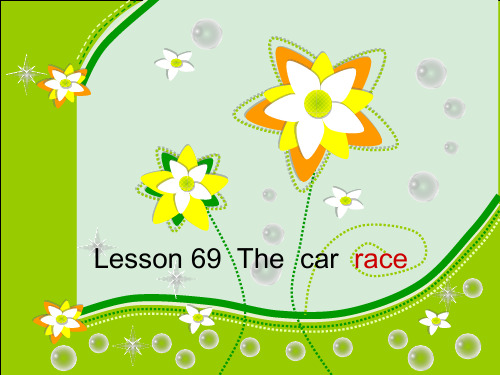
• class+room—classroom 教室
• class+mate-classmate同学
• house+wife-housewife家庭主妇
• police+man-policeman警察
• bed+room-bedroom 卧室
21.06.2019
• How old 意为“多大年龄,几
岁”,是用来询问年龄的疑问词组。
其中old为形容词,指年龄。其句
型机构为“How old+be+主语”,
表示“……几岁\多大了”,答语
常用句型“主语+be+基数词
+years old\months”.也可以直接
说年龄。
21.06.2019
8
• How old is Bob? • 同义句:What’s Bob’s age?
• 与day的区别: • day • 1.意为“天”,指24小时,一整天。What day is it
today? • 2.指“特定的重大的日子、节日”,It is Children’s Day. • 3.意为“白昼”,与night相对。day and night白天和夜
晚。
21.06.2019
7
How old are you,Alice?
• 1.when疑问副词,意为“什么时候”,引导特殊疑 问句,其结构为“when+一般疑问句?”。When可 以对年、月、日以及时刻进行提问或者询问某一动 作发生的时间。
• eg:When do you go to school ?
• When are you at home? • 2.birthday是由名词birth“出生”和名词day“日子”
新概念英语第二册Lesson 69 (共63张PPT)

New words and expressions
• They managed to put on the brakes just
___in__t_im__e.
New words and expressions
• Living with a conscience is like driving a car with the brakes on.
It’s not certain how the fire started but it might _h__a_ve__b_e_e_n__ca_u_s_e_d_ by an electrical fault.
•TEXT
Text
• I was being tested for a driving license for the third time.
•
-- Budd Schulberg
•GRAMMAR
Grammar 被动语态
• 复习:
时态 一般现在时
主动语态 do/does
被动语态 am/is/are done
一般过去时
did
was/were done
Grammar
• 复习:
时态 现在完成时
过去完成时
主动语态
被动语态
have/has done have/has been done
Text
• Sure that I had passed, I was almost beginning to enjoy my test.
Text
• enjoy, entertain and amuse:
• I was almost beginning to enjoy my test. • He entertained me to dinner. • The children were amused by the circus
新概念英语第二册 Lesson 69

adj. instructive 有益的;教育性的 instructional 教学的;指导的,教育的
adv. instructively 有益地;教育地 n. instruction 指令,命令;指示;教导;用法说明 instructor 指导书;教员;指导者 instructress 女教师;女指导
suppose
vt. 1. 假使,假定 Supposing he isn't out, how can I do then? 假定他没出去,我该怎么办呢? Let's first suppose the second defense line has been destroyed. 我们先来假定这第二条防线已被摧毁。 2. [用于祈使句]让 Suppose we wait until tomorrow. 咱们就等到明天吧。 Suppose I tell you.我来告诉你吧。 3. 猜想,推测 I suppose he'll come back now. 我想他这会儿该回来了。 You can't suppose whom I met in the street. 你准猜不着我在大街上看见谁啦。 4. 认为,以为 What do you suppose I will do? 你认为我会做什么? 5. 意味着;说明(或证明)…的事实(或情况) The number of the cars supposes that the city traffic would get busier and busier. 这些汽车的数量意味着该市的交通会越来越拥挤。 That doesn't suppose you were absent at the scene of the crime. 那并不能说明你不在犯罪现场。 6. 假定…的存在;需要…的存在为先决条件 First, we have to suppose that she was out to make money. 首先,我们得假定她抛头露面是为了赚钱。
新概念英语第二册69课课后习题详细答案
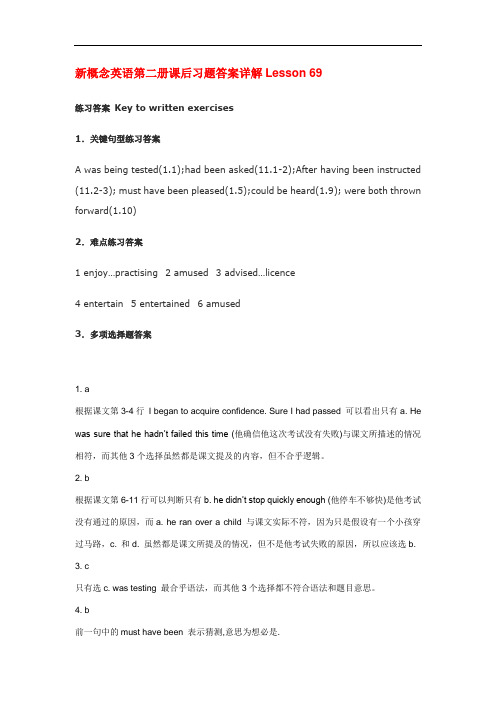
新概念英语第二册课后习题答案详解Lesson 69练习答案Key to written exercises1.关键句型练习答案A was being tested(1.1);had been asked(11.1-2);After having been instructed(11.2-3); must have been pleased(1.5);could be heard(1.9); were both thrown forward(1.10)2.难点练习答案1 enjoy…practi sing2 amused3 advised…licence4 entertain5 entertained6 amused3.多项选择题答案1. a根据课文第3-4行I began to acquire confidence. Sure I had passed 可以看出只有a. He was sure that he hadn’t failed this time (他确信他这次考试没有失败)与课文所描述的情况相符,而其他3个选择虽然都是课文提及的内容,但不合乎逻辑。
2. b根据课文第6-11行可以判断只有b. he didn’t stop quickly enough (他停车不够快)是他考试没有通过的原因,而a. he ran over a child 与课文实际不符,因为只是假设有一个小孩穿过马路,c. 和d. 虽然都是课文所提及的情况,但不是他考试失败的原因,所以应该选b.3. c只有选c. was testing 最合乎语法,而其他3个选择都不符合语法和题目意思。
4. b前一句中的must have been 表示猜测,意思为想必是.a. had to be (不得不), c. was certainly (确定无疑的), d. should be(应该)这3个选择都与must have been 的含义不太一样,只有b. was probably(可能是)与其含义相同,因此应该选b.5. b前一句Let us suppose that a child suddenly crosses the road 中的主要动词suppose 和从句中的crosses都是一般现在时,表示当时发生的动作,意思为"让我们假设一个小孩突然穿过马路".该句只有选b. Imagine it happening (想象它正在发生)才与前一句含义相符合. a. would happen 是过去将来时, c. had been happening 过去完成进行时, d. will have happened 将来完成时.这3个选择都不能表示现在发生的情况,因为时态都与imagine不符合.6. c该句中的动词continue(继续)后面只能跟名词,动名词和带to的动词不定式才合乎语法。
新概念二第69课作文答案

新概念二第69课作文答案英文回答:In Lesson 69 of New Concept English, the topic is about the importance of learning a foreign language. Learning a foreign language has become increasingly important intoday's globalized world. Firstly, it allows us to communicate with people from different countries and cultures. For example, if I am able to speak Mandarin Chinese, I can easily communicate with Chinese people when I travel to China or when I meet Chinese people in my own country. This opens up opportunities for cultural exchange, business partnerships, and friendships. Secondly, learning a foreign language can enhance our cognitive abilities. Studies have shown that bilingual individuals have better problem-solving skills, improved memory, and increased creativity. This is because learning a new language requires us to think in different ways and adapt to different linguistic structures. Finally, learning a foreign language can also boost our career prospects. Intoday's global job market, employers often value candidates who can speak multiple languages. Being bilingual or multilingual can give us a competitive edge and increase our chances of getting hired for international positions or assignments.中文回答:在《新概念英语》第69课中,讨论了学习外语的重要性。
新概念英语69课课文
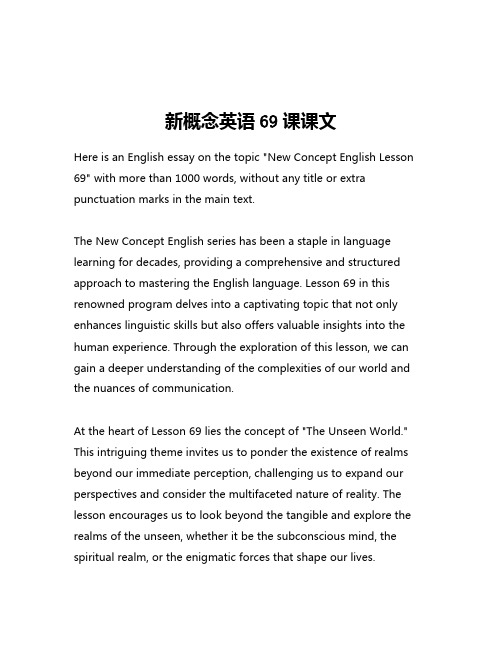
新概念英语69课课文Here is an English essay on the topic "New Concept English Lesson 69" with more than 1000 words, without any title or extra punctuation marks in the main text.The New Concept English series has been a staple in language learning for decades, providing a comprehensive and structured approach to mastering the English language. Lesson 69 in this renowned program delves into a captivating topic that not only enhances linguistic skills but also offers valuable insights into the human experience. Through the exploration of this lesson, we can gain a deeper understanding of the complexities of our world and the nuances of communication.At the heart of Lesson 69 lies the concept of "The Unseen World." This intriguing theme invites us to ponder the existence of realms beyond our immediate perception, challenging us to expand our perspectives and consider the multifaceted nature of reality. The lesson encourages us to look beyond the tangible and explore the realms of the unseen, whether it be the subconscious mind, the spiritual realm, or the enigmatic forces that shape our lives.One of the key aspects of this lesson is the exploration of the human psyche and the hidden depths of our consciousness. The lesson delves into the concept of the subconscious mind, the vast repository of thoughts, memories, and emotions that often operate below the surface of our conscious awareness. Through the examination of this unseen realm, we are prompted to consider the ways in which our unconscious thoughts and feelings influence our behaviors, decisions, and overall well-being.The lesson also touches upon the realm of the spiritual, inviting us to contemplate the existence of forces and energies that transcend the physical world. Whether one believes in the presence of a higher power, the interconnectedness of all things, or the existence of unseen entities, Lesson 69 encourages us to explore these concepts with an open and inquisitive mind. By doing so, we may uncover new perspectives on the nature of our existence and our place within the grand scheme of the universe.Furthermore, the lesson explores the concept of the "unseen world" in the context of communication and interpersonal relationships. It highlights the importance of recognizing the unspoken nuances, the subtle gestures, and the underlying emotions that shape our interactions with others. By becoming more attuned to these unseen elements, we can develop a deeper understanding of the people in our lives and foster more meaningful and empathetic connections.One of the key takeaways from Lesson 69 is the recognition that the world is not limited to what we can immediately perceive with our senses. There are layers of complexity and interconnectedness that lie beneath the surface, waiting to be discovered and explored. By embracing this concept, we can cultivate a sense of wonder and curiosity about the world around us, constantly seeking to uncover the hidden truths and insights that shape our existence.Moreover, the lesson encourages us to approach the unseen world with a sense of humility and openness. It reminds us that there is much we do not know or understand, and that by acknowledging our limitations, we can become more receptive to new ideas, perspectives, and experiences. This mindset can lead to personal growth, increased empathy, and a deeper appreciation for the mysteries of the universe.In conclusion, Lesson 69 of the New Concept English series is a powerful exploration of the unseen world that lies beyond our immediate perception. Through this lesson, we are challenged to expand our understanding of reality, delve into the depths of the human psyche, and consider the spiritual and energetic forces that shape our lives. By embracing the concepts presented in this lesson, we can cultivate a greater sense of wonder, empathy, and connection with the world around us, ultimately enriching our personal andintellectual growth. As we continue our journey through the New Concept English program, Lesson 69 stands as a testament to the transformative power of language learning and the endless possibilities that lie within the unseen realms of our existence.。
新概念英语课件第69课

介词的用法
At:具体地点 at school at home
具体时间 at the weekend at 6 o’clock On:具体哪一天
on Monday on 1st August In:Байду номын сангаас糊时间与地点
in July in China
Exercises
用 at on in 完成句子
summary
一般现在时与一般过去时的用法 二者之间的转换 In on at介词的用法
一般过去时的应用
动词的过去式:在表示过去发生的事情时,句子中
的动词需要用过去式。
动词过去式的变化规则:
1.v+ed
clean-cleaned
2.以e结尾+d move-moved
3.不规则动词:
Here were some butterflies yesterday.
Lesson 70
When were they there?
stationer[`steiʃənə]
stationer’s 文具店
at the stationer’s
在文具店里
Denmark[`denmɑ:k]
Danish[`deiniʃ] 丹麦人 Where are you from ? I am from Denmark. What nationnality are you ? I am Danish.
everyday,but yesterday she forgot to do it.
There were hundreds of people there . My wife and I were at the race . Our friends Julie and Jack were there , too.
新概念二第69课作文答案
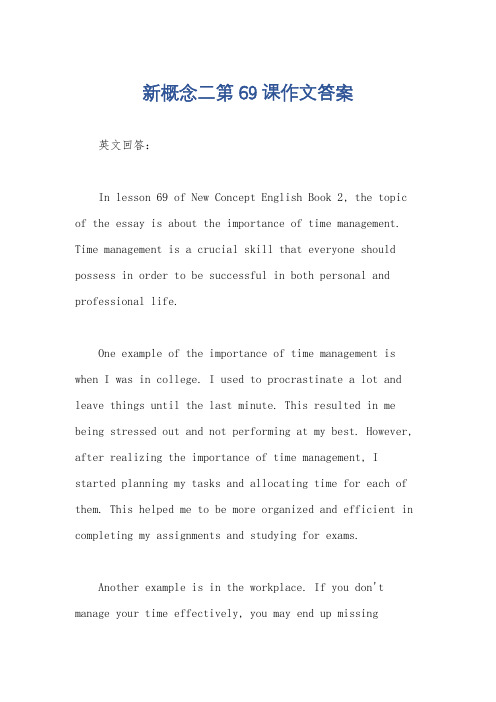
新概念二第69课作文答案英文回答:In lesson 69 of New Concept English Book 2, the topic of the essay is about the importance of time management. Time management is a crucial skill that everyone should possess in order to be successful in both personal and professional life.One example of the importance of time management is when I was in college. I used to procrastinate a lot and leave things until the last minute. This resulted in me being stressed out and not performing at my best. However, after realizing the importance of time management, I started planning my tasks and allocating time for each of them. This helped me to be more organized and efficient in completing my assignments and studying for exams.Another example is in the workplace. If you don't manage your time effectively, you may end up missingdeadlines, which can have negative consequences on your career. By prioritizing tasks and setting deadlines foreach of them, you can ensure that you are meeting yourgoals and delivering quality work on time.Overall, time management is a skill that can greatly impact your success and well-being. It allows you to makethe most out of your day and achieve your goals efficiently.中文回答:在新概念英语第二册第69课中,文章的主题是关于时间管理的重要性。
69新概念英语第二册69课

New words and expressions
• murder ['mə:də]
n. 谋杀
• instruct [in'strʌkt]
v. 命令,指示
• acquire [ə'kwaiə]
v. 取得,获得
• confidence ['kɔnfidəns] n. 信心
• drive • 1)v. • Can you drive me home/to the station? • The death of her son drove her mad. • Failure drove him to suicide. • 2)n. 路程,车程 • 到车站只有几分钟车程。 • It’s only a few minutes’ drive to the station.
But not murder
• I was being tested for a driving licence for the third time. I had been asked to drive in heavy traffic and had done so successfully. After having been instructed to drive out of town, I began to acquire confidence. Sure that I had passed, I was almost beginning to enjoy my test. The examiner must have been pleased with my performance, for he smiled and said, 'Just one more thing, Mr. Eames. Let us suppose that a child suddenly crosses the road in front of you.
Lesson69Notmurder课文详解与练习-新概念英语第二册

新概念英语第二册Lesson 69But not murder!并非谋杀!I was being tested for a driving licence for the third time. I had been asked to drive in heavy traffic and had done so successfully. After having been instructed to drive out of town, I began to acquire confidence. Sure that I had passed, I was almost beginning to enjoy my test. The examiner must have been pleased with my performance, for he smiled and said. Just one more thing, Mr.Eames. Let us suppose that a child suddenly crosses the road in front of you. As soon as I tap on the window, you must stop within five feet. I continued driving and after some time, the examiner tapped loudly, Though the sound could be heard clearly, it took me a long time to react. I suddenly pressed the brake pedal and we were both thrown forward. The examiner looked at me sadly. Mr.Eames, he said, in a mournful voice, you have just killed that child!【课文翻译】I was being tested for a driving licence for the third time.我第3次接受驾驶执照考试。
新概念第二册课堂笔记Lesson 69
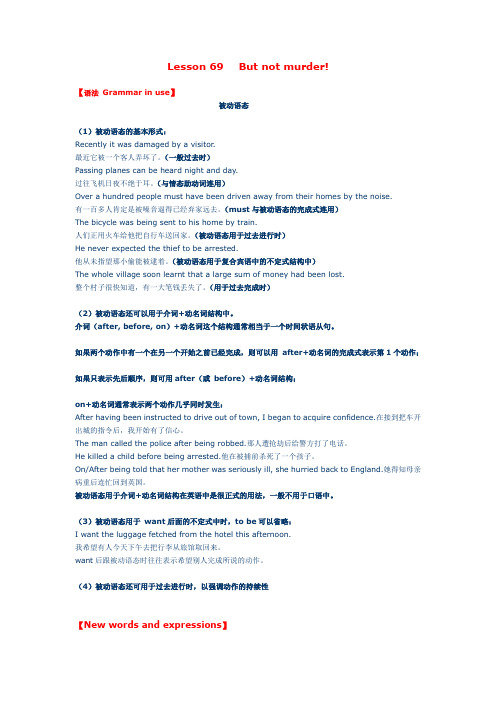
Lesson 69 But not murder!【语法Grammar in use】被动语态(1)被动语态的基本形式:Recently it was damaged by a visitor.最近它被一个客人弄坏了。
(一般过去时)Passing planes can be heard night and day.过往飞机日夜不绝于耳。
(与情态助动词连用)Over a hundred people must have been driven away from their homes by the noise.有一百多人肯定是被噪音逼得已经弃家远去。
(must与被动语态的完成式连用)The bicycle was being sent to his home by train.人们正用火车给他把自行车送回家。
(被动语态用于过去进行时)He never expected the thief to be arrested.他从未指望那小偷能被逮着。
(被动语态用于复合宾语中的不定式结构中)The whole village soon learnt that a large sum of money had been lost.整个村子很快知道,有一大笔钱丢失了。
(用于过去完成时)(2)被动语态还可以用于介词+动名词结构中。
介词(after, before, on)+动名词这个结构通常相当于一个时间状语从句。
如果两个动作中有一个在另一个开始之前已经完成,则可以用after+动名词的完成式表示第1个动作;如果只表示先后顺序,则可用after(或before)+动名词结构;on+动名词通常表示两个动作几乎同时发生:After having been instructed to drive out of town, I began to acquire confidence.在接到把车开出城的指令后,我开始有了信心。
新概念英语二册L69课

2). 被动语态的特殊结构形式
1) 带情态动词的被动结构。
其形式为:情态动词+be+过去分词。
eg :The baby should be taken good care of
by the babysitter. 2) 有些动词可以有两个宾语,在用于被动结构时, 可以把主动结构中的一个宾语变为主语,另一宾语 仍然保留在谓语后面。通常变为主语的是间接宾语。
As soon as I tap on the window, you must stop within five feet.„ I continued driving and after some time, the examiner tapped loudly. Though the sound could be heard clearly, it took me a long time to react. I suddenly pressed the brake pedal hard and we were both thrown forward. The examiner looked at me sadly. 'Mr. Eames,' he said, in a mournful voice, 'you have just killed that child!'
他用小棒敲打盒子。
Who's tapping at the window?
谁在轻轻敲着窗?
tap sb.+ prep.+部位 轻拍某人某部位 tap sb. on the shoulder 轻拍某人肩膀 n. 敲门声; 水龙头
新概念英语第二册69课
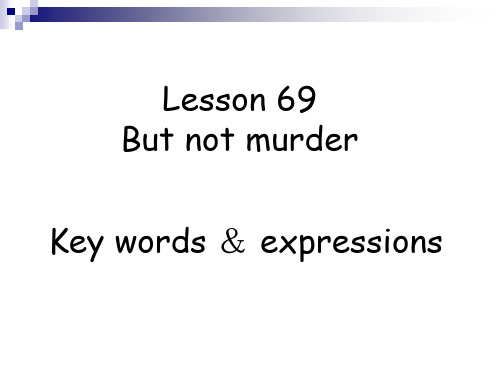
murder
1. n. 谋杀、谋杀案 [u] / c] be guilty of murder 犯谋杀罪 six murders in a week 一周六起谋杀案 Murder will out. 谋杀案终究要暴露,纸包不住火 2. v. murder sb 谋杀... 3. (喻)糟蹋某(事物) murder the English language. murderer n. 谋杀犯 murderess n. 女谋杀犯
homicide n. [u]杀人(犯) man slaughter [u]非预谋杀人罪,过失杀人 killer 杀人犯,职业杀手,屠夫 assassinate 暗杀 poison 毒杀 massacre / slaughter 大屠杀 suffocate 使窒息而死 strangle 勒死 execute 处决 hang 处以绞刑
3. 诊察,检查身体 The doctor examined him thoroughly.
examiner n. 主考人 examinee n. 被考人 examination n. 考试(正式说法) exam 缩略形式
suppose
1. v. 假定、假设 Suppose that this statement is right. Suppose the girl to be your daughter. Suppose that you are the generalmanager, what will you do on that occasion? 2. v. 认为,猜想 I suppose she'll be there today. Will he come ? Yes, I suppose so.
新概念第二册课文翻译及学习笔记【Lesson67、68、69】
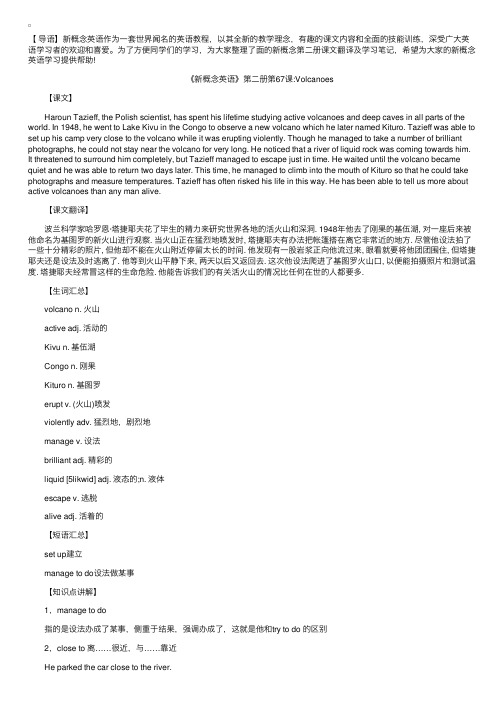
【导语】新概念英语作为⼀套世界闻名的英语教程,以其全新的教学理念,有趣的课⽂内容和全⾯的技能训练,深受⼴⼤英语学习者的欢迎和喜爱。
为了⽅便同学们的学习,为⼤家整理了⾯的新概念第⼆册课⽂翻译及学习笔记,希望为⼤家的新概念英语学习提供帮助!《新概念英语》第⼆册第67课:Volcanoes【课⽂】Haroun Tazieff, the Polish scientist, has spent his lifetime studying active volcanoes and deep caves in all parts of the world. In 1948, he went to Lake Kivu in the Congo to observe a new volcano which he later named Kituro. Tazieff was able to set up his camp very close to the volcano while it was erupting violently. Though he managed to take a number of brilliant photographs, he could not stay near the volcano for very long. He noticed that a river of liquid rock was coming towards him. It threatened to surround him completely, but Tazieff managed to escape just in time. He waited until the volcano became quiet and he was able to return two days later. This time, he managed to climb into the mouth of Kituro so that he could take photographs and measure temperatures. Tazieff has often risked his life in this way. He has been able to tell us more about active volcanoes than any man alive.【课⽂翻译】波兰科学家哈罗恩·塔捷耶夫花了毕⽣的精⼒来研究世界各地的活⽕⼭和深洞. 1948年他去了刚果的基伍湖, 对⼀座后来被他命名为基图罗的新⽕⼭进⾏观察. 当⽕⼭正在猛烈地喷发时, 塔捷耶夫有办法把帐篷搭在离它⾮常近的地⽅. 尽管他设法拍了⼀些⼗分精彩的照⽚, 但他却不能在⽕⼭附近停留太长的时间. 他发现有⼀股岩浆正向他流过来, 眼看就要将他团团围住, 但塔捷耶夫还是设法及时逃离了. 他等到⽕⼭平静下来, 两天以后⼜返回去. 这次他设法爬进了基图罗⽕⼭⼝, 以便能拍摄照⽚和测试温度. 塔捷耶夫经常冒这样的⽣命危险. 他能告诉我们的有关活⽕⼭的情况⽐任何在世的⼈都要多.【⽣词汇总】volcano n. ⽕⼭active adj. 活动的Kivu n. 基伍湖Congo n. 刚果Kituro n. 基图罗erupt v. (⽕⼭)喷发violently adv. 猛烈地,剧烈地manage v. 设法brilliant adj. 精彩的liquid [5likwid] adj. 液态的;n. 液体escape v. 逃脱alive adj. 活着的【短语汇总】set up建⽴manage to do设法做某事【知识点讲解】1,manage to do指的是设法办成了某事,侧重于结果,强调办成了,这就是他和try to do 的区别2,close to 离……很近,与……靠近He parked the car close to the river.Don’t sit so close to the fire.3,risk⽤法汇总risk one’s life 冒着⽣命危险take a risk of… =at a risk of… 冒着……的危险risk sth.=risk losing sth. 冒着失去……的危险risk doing sth. 冒着做……的危险《新概念英语》第⼆册第68课:persistent【课⽂】I crossed the street to avoid meeting him, but he saw me and came running towards me. It was no use pretending that I had not seen him, so I waved to him. I never enjoy meeting Nigel Dykes. He never has anything to do. No matter how busy you are, he always insists on coming with you. I had to think of a way of preventing him from following me around all morning.'Hello, Nigel,' I said. 'Fancy meeting you here!''Hi, Elizabeth,' Nigel answered. 'I was just wondering how to spend the morning -- until I saw you. You're not busy doing anything, are you?''No, not at all,' I answered. 'I'm going to...''Would you mind my coming with you?' he asked, before I had finished speaking.'Not at all,' I lied, 'but I'm going to the dentist.''Then I'll come with you,' he answered. 'There's always plenty to read in the waiting room!’【课⽂翻译】我穿过马路以便避开他, 但他看到我并朝我跑过来. 若再装作没看见他已是没有⽤了, 我只好向他招⼿。
(完整版)新概念英语第二册69课

brake 同音词:break
1. n. 闸,刹车 Her brake failed. 她的刹车失灵了 put on the brakes 踩刹车
2. v.刹车 The driver braked hard as the dog ran onto the road. 当狗跑到马路上时司机猛踩 刹车
John supposed that he was a teacher.
be supposed to 理应... 应当... He is supposed to be there on time. 他理应准时到那里 We are supposed to help each other. 我们应该互相帮助
instruct
1. v. 向...下命令或指示,指导 eg. They haven't instructed us where to go . 他没有指示我们去哪里 I instructed him to lock the door. 我命令他去锁门
The teacher instructed the pupils to come into the classroom. 老师命令学生进教室
confidence n. [u]信赖,把握,信心 have confidence in sb /sth 对...有信心 lose confidence in sb /sth 对...失去信心 You should have confidence in yourself. He answered the questions with confidence. 他信心十足地回答问题 be full of confidence 充满信心 confident adj. 有信心的,自信的 confidant 心腹之交
But not murder!并非谋杀!新概念英语第二册自学导读笔记第69课

But not murder!并非谋杀!新概念英语第二册自学导读笔记第69课新概念英语第二册第69课课文重难点 further notes on the text1.to drive in heavy traffic, 在车辆拥挤的路上驾驶。
heavy在这里表示"大量的"、"多的"、"密集的":traffic is heavier on this road than on the other one.这条路上的交通比另一条路上拥挤。
2.…i began to acquire confidence.……我开始有了信心。
acquire通常表示通过努力"获得"、"学到(知识、技术、语言等)",也可用来表示"养成(习惯等)":mary acquired a good knowledge of chinese in five years' time.5年之内玛丽学会了汉语。
tom acquired a habit of smoking.汤姆养成了抽烟的习惯。
3.sure that i had passed…确信我已通过考试……句首省略了分词being或feeling,在句中作状语(与分词结构作状语的情况类似):interested in the story, he finished reading the book in two hours.因为对故事(情节)感兴趣,他两个小时就把那本书读完了。
4.the examiner must have been pleased with my performance…主考人对我的驾驶想必是满意的……must have been表示对过去的事情实行猜测。
performance在这里表示"表现"、"表演"、"工作情况"等。
- 1、下载文档前请自行甄别文档内容的完整性,平台不提供额外的编辑、内容补充、找答案等附加服务。
- 2、"仅部分预览"的文档,不可在线预览部分如存在完整性等问题,可反馈申请退款(可完整预览的文档不适用该条件!)。
- 3、如文档侵犯您的权益,请联系客服反馈,我们会尽快为您处理(人工客服工作时间:9:00-18:30)。
New words and e • • • murder ['mə:də] instruct [in'strʌkt] acquire [ə'kwaiə] confidence ['kɔnfidəns] examiner [ig'zæ minə] suppose [sə'pəuz] tap [tæ p] react [ri'æ kt] brake [breik] pedal ['pedl] mournful ['mɔ:nfəl] n. 谋杀 v. 命令,指示 v. 取得,获得 n. 信心 n. 主考人 v. 假设 v. 轻敲 v. 反应 n. 刹车 n. 踏板 adj. 悲哀的
• I continued driving and after some time, the examiner tapped loudly. Though the sound could be heard clearly, it took me a long time to react.
• The examiner looked at me sadly. 'Mr. Eames,' he said, in a mournful voice, 'you have just killed that child!‘
• I was being tested for a driving licence for the third time.
• I had been asked to drive in heavy traffic and had done so successfully.
• After having been instructed to drive out of town, I began to acquire confidence. • Sure that I had passed, I was almost beginning to enjoy my test. The examiner must have been pleased with my performance, for he smiled and said,
• 'Just one more thing, Mr. Eames. Let us suppose that a child suddenly crosses the road in front of you. As soon as I tap on the window, you must stop within five feet.'
